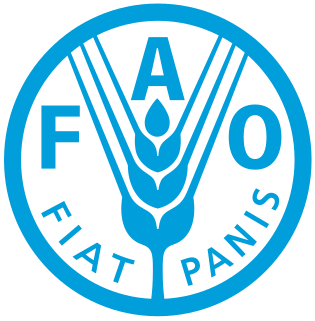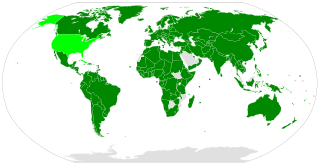
Food is any substance consumed to provide nutritional support for an organism. Food is usually of plant, animal, or fungal origin, and contains essential nutrients, such as carbohydrates, fats, proteins, vitamins, or minerals. The substance is ingested by an organism and assimilated by the organism's cells to provide energy, maintain life, or stimulate growth. Different species of animals have different feeding behaviours that satisfy the needs of their unique metabolisms, often evolved to fill a specific ecological niche within specific geographical contexts.

The Food and Agriculture Organization of the United Nations (FAO) is a specialized agency of the United Nations that leads international efforts to defeat hunger and improve nutrition and food security. Its Latin motto, fiat panis, translates to "let there be bread". It was founded on 16 October 1945.
The International Treaty on Plant Genetic Resources for Food and Agriculture, is a comprehensive international agreement in harmony with the Convention on Biological Diversity, which aims at guaranteeing food security through the conservation, exchange and sustainable use of the world's plant genetic resources for food and agriculture (PGRFA), the fair and equitable benefit sharing arising from its use, as well as the recognition of farmers' rights. It was signed in 2001 in Madrid, and entered into force on 29 June 2004.

Food security is the measure of the availability of food and individuals' ability to access it. According to the United Nations' Committee on World Food Security, food security is defined as meaning that all people, at all times, have physical, social, and economic access to sufficient, safe, and nutritious food that meets their food preferences and dietary needs for an active and healthy life. The availability of food irrespective of class, gender or region is another one. There is evidence of food security being a concern many thousands of years ago, with central authorities in ancient China and ancient Egypt being known to release food from storage in times of famine. At the 1974 World Food Conference, the term "food security" was defined with an emphasis on supply; food security is defined as the "availability at all times of adequate, nourishing, diverse, balanced and moderate world food supplies of basic foodstuffs to sustain a steady expansion of food consumption and to offset fluctuations in production and prices". Later definitions added demand and access issues to the definition. The first World Food Summit, held in 1996, stated that food security "exists when all people, at all times, have physical and economic access to sufficient, safe and nutritious food to meet their dietary needs and food preferences for an active and healthy life."
World Food Summits are convened by the Food and Agriculture Organization of the United Nations.

The International Covenant on Economic, Social and Cultural Rights (ICESCR) is a multilateral treaty adopted by the United Nations General Assembly (GA) on 16 December 1966 through GA. Resolution 2200A (XXI), and came in force from 3 January 1976. It commits its parties to work toward the granting of economic, social, and cultural rights (ESCR) to the Non-Self-Governing and Trust Territories and individuals, including labour rights and the right to health, the right to education, and the right to an adequate standard of living. As of July 2020, the Covenant has 171 parties. A further four countries, including the United States, have signed but not ratified the Covenant.
Economic, social and cultural rights are socio-economic human rights, such as the right to education, right to housing, right to an adequate standard of living, right to health, victims' rights and the right to science and culture. Economic, social and cultural rights are recognised and protected in international and regional human rights instruments. Member states have a legal obligation to respect, protect and fulfil economic, social and cultural rights and are expected to take "progressive action" towards their fulfilment.

World Food Day is an international day celebrated every year worldwide on 16 October to commemorate the date of the founding of the United Nations Food and Agriculture Organization in 1945. The day is celebrated widely by many other organizations concerned with hunger and food security, including the World Food Programme, the World Health Organization and the International Fund for Agricultural Development. WFP received the Nobel Prize in Peace for 2020 for their efforts to combat hunger, contribute to peace in conflict areas, and for playing a leading role in stopping the use of hunger in the form of a weapon for war and conflict.

The human right to water and sanitation (HRWS) is a principle that acknowledges that clean drinking water and sanitation are essential to every person's life. It was recognized as a human right by the United Nations General Assembly on 28 July 2010. The HRWS has been recognized in international law through human rights treaties, declarations and other standards. Some commentators have derived the human right to water beyond the General Assembly resolution from Article 11.1 of the International Covenant on Economic, Social and Cultural Rights (ICESCR), making it binding under international law. Other treaties that explicitly recognize the HRWS include the 1979 Convention on the Elimination of All Forms of Discrimination Against Women (CEDAW) and the 1989 Convention on the Rights of the Child (CRC).

The right to food, and its variations, is a human right protecting the right of people to feed themselves in dignity, implying that sufficient food is available, that people have the means to access it, and that it adequately meets the individual's dietary needs. The right to food protects the right of all human beings to be free from hunger, food insecurity and malnutrition. The right to food does not imply that governments have an obligation to hand out free food to everyone who wants it, or a right to be fed. However, if people are deprived of access to food for reasons beyond their control, for example, because they are in detention, in times of war or after natural disasters, the right requires the government to provide food directly.

The right to housing is the economic, social and cultural right to adequate housing and shelter. It is recognized in some national constitutions and in the Universal Declaration of Human Rights and International Covenant on Economic, Social and Cultural Rights.The right to housing is regarded as a freestanding right in the International human rights law which was clearly in the 1991 General Comment on Adequate Housing by the UN Committee on Economic, Social and Cultural Rights. The aspect of the right to housing under ICESCR include: availability of services, infrastructure, material and facilities; legal security of tenure; habitability; accessibility; affordability; location and cultural adequacy.
The right to social security is recognized as a human right and establishes the right to social security assistance for those unable to work due to sickness, disability, maternity, employment injury, unemployment or old age. Social security systems provided for by states consist of social insurance programs, which provide earned benefits for workers and their families by employment contributions, and/or social assistance programs which provide non-contributory benefits designed to provide minimum levels of social security to persons unable to access social insurance.
Human rights and climate change is a conceptual and legal framework under which international human rights and their relationship to global warming are studied, analyzed, and addressed. The framework has been employed by governments, United Nations organizations, intergovernmental and non-governmental organizations, human rights and environmental advocates, and academics to guide national and international policy on climate change under the United Nations Framework Convention on Climate Change (UNFCCC) and the core international human rights instruments. In 2022 Working Group II of the IPCC suggested that "climate justice comprises justice that links development and human rights to achieve a rights-based approach to addressing climate change".
The Rome Declaration on World Food Security is a document adopted at the 1996 World Food Summit took place in Rome, Italy between 13 and 17 November 1996. The summit was organised by the Food and Agriculture Organization of the United Nations (FAO). The Declaration reaffirms the right of everyone to have access to safe and nutritious food consistent with the right to adequate food and the fundamental right of everyone to be free from hunger and pledges political will and common and national commitment to achieving food security for all and to an ongoing effort to eradicate hunger in all countries with an immediate view to reducing the number of undernourished people to half their present level no later than 2015. Therefore, the document has important significance in relation to Food security and the Right to food. Signatories commit to the implementation of the World Food Summit Plan of Action.
The 1997 Maastricht Guidelines on Violations of Economic, Social and Cultural Rights build on the 1987 Limburg Principles on the Implementation of the International Covenant on Economic, Social and Cultural Rights and identify the legal implications of acts and omissions which are violations of economic, social and cultural rights. The guidelines were adopted by a group of over thirty experts who convened from 22–26 January 1997 in Maastricht on the occasion of the Limburg Principles' 10th anniversary. Three years later, the Maastricht Guidelines along with the Limburg Principles were reissued as UN document E/C.12/2000/13 by the Committee on Economic, Social and Cultural Rights (CESCR).
The Universal Declaration on the Eradication of Hunger and Malnutrition was adopted on 16 November 1974, by governments who attended the 1974 World Food Conference that was convened under General Assembly resolution 3180 (XXVIII) of 17 December 1973. It was later endorsed by General Assembly resolution 3348 (XXIX), of 17 December 1974. This Declaration combined discussions of the international human right to adequate food and nutrition with an acknowledgement of the various economic and political issues that can affect the production and distribution of food related products. Within this Declaration, it is recognised that it is the common purpose of all nations to work together towards eliminating hunger and malnutrition. Further, the Declaration explains how the welfare of much of the world's population depends on their ability to adequately produce and distribute food. In doing so, it emphasises the need for the international community to develop a more adequate system to ensure that the right to food for all persons is recognised. The opening paragraph of the Declaration, which remains to be the most recited paragraph of the Declaration today, reads:
Every man, woman and child has the inalienable right to be free from hunger and malnutrition in order to develop fully and maintain their physical and mental faculties.
The Declaration of the World Food Summit: five years later was adopted by governments at the 2002 World Food Summit that was convened by the Food and Agriculture Organization of the United Nations. Among others, the declaration calls for the establishment of an intergovernmental working group to prepare a set of guidelines on the implementation of the right to food, resulting in the drafting of the Right to Food Guidelines. It also unanimously adopted a declaration calling on the international community to fulfil an earlier pledge to cut the number of hungry people to about 400 million by 2015. That pledge was made at the original World Food Summit in 1996 - the largest-ever global gathering of leaders to address hunger and food security - and progress towards it remained disappointingly slow.
This section provides an overview of the status of the right to food at a national level.

Development is a human right that belongs to everyone, individually and collectively. Everyone is “entitled to participate in, contribute to, and enjoy economic, social, cultural and political development, in which all human rights and fundamental freedoms can be fully realized,” states the groundbreaking UN Declaration on the Right to Development, proclaimed in 1986.
The Declaration on the Rights of Peasants (UNDROP), officially United Nations Declaration on the Rights of Peasants and Other People Working in Rural Areas, is an UNGA resolution on Human rights with "universal understanding", adopted by the United Nations in 2018.








